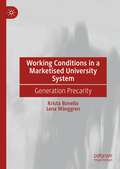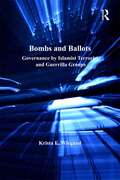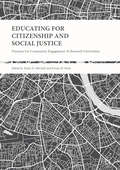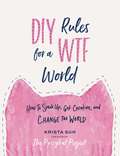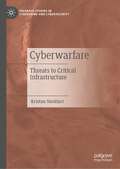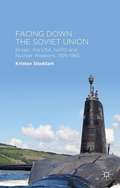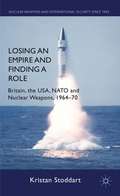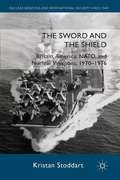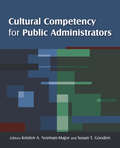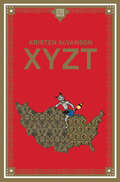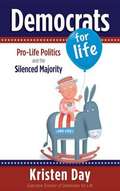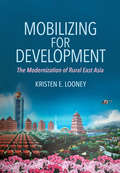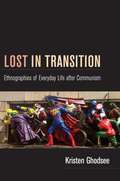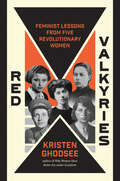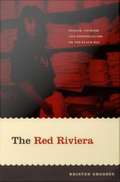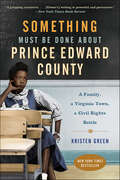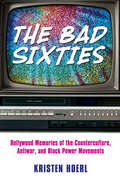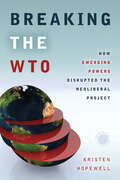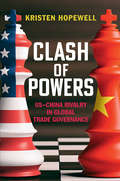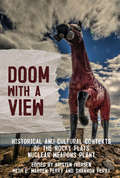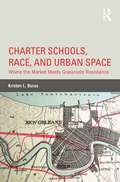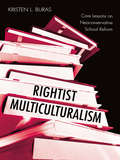- Table View
- List View
Working Conditions in a Marketised University System: Generation Precarity
by Lena Wånggren Krista BonelloThis book provides an in-depth qualitative report on casualised academic staff in the UK, mapping shared experiences and strategies for resistance. Bringing together testimonial data spanning five years, it offers evidence of how precarious labour conditions have persisted, shifted and intensified. The book will be a valuable resource for students and scholars in the fields of education, human resources management, labour studies and sociology, as well as trade unionists and university policymakers.
Bombs and Ballots: Governance by Islamist Terrorist and Guerrilla Groups
by Krista E. WiegandEventually, most terrorist and guerrilla groups are defeated by governments or gradually die off - sometimes becoming political parties, democratically participating in the non-violent governance of their states. Yet some terrorist and guerrilla groups maintain military capabilities, using violence and democratic participation simultaneously. Here, Krista E. Wiegand examines the different political strategies that Islamist terrorist and guerrilla groups use to achieve their political objectives. Focussing on Hezbollah in Lebanon and Hamas in Palestine, Wiegand skilfully reveals the factors that determine why Islamist militant groups become involved in governance as political parties, how mainstream governments may or may not accept them as legitimate, why some groups like al- Gama'a al-Islamiya in Egypt renounce guerrilla tactics, and how some groups govern whilst employing political violence. Bombs and Ballots is a valuable contribution to the study of state-society relations in the Middle East, exposing the blurred line between terrorist activity and governance.
Educating for Citizenship and Social Justice
by Krista M. Soria Tania D. MitchellIn this edited volume, authors explore the ways in which departments, programs, and centers at public research universities are working to better engage students in the work of citizenship and social justice. The chapters in this book illuminate the possibilities and challenges for developing community engagement experiences and provide evidence of the effects of these efforts on communities and undergraduate students' development of citizenship outcomes. This text reveals how important the integration of our intentions and actions are to create a community engaged practice aimed towards justice.
DIY Rules for a WTF World: How to Speak Up, Get Creative, and Change the World
by Krista SuhFrom the creator of the Pussyhat Project comes a manifesto for every woman to create her own distinct and original path to joy, success, and impact.On January 21, 2017, millions of protestors took part in the Women's March, and many of them created a "sea of pink" when they wore knitted pink "pussyhats" in record numbers. The pussyhat swiftly found its place on the cover of TIME and the New Yorker, and it ultimately came to symbolize resistance culture. Creator of the Pussyhat Project, Krista Suh, took an idea and built a worldwide movement and symbol in just two months. But like so many women, Krista spent years letting her fears stop her from learning to live by her own rules. Now in DIY RULES FOR A WTF WORLD, Krista Suh shares the tools, tips, experiences, "rules," and knitting patterns she uses to get creative, get bold, and change the world. From learning how to use your own intuition to decide which rules are right for you to finding your inner-courage to speak up fearlessly; from finding what your passions are (this might surprise you!) to dealing with the squelchers out there, DIY RULES FOR THE WTF WORLD not only inspires you to demolish the patriarchy, but also enables you to create your own rules for living, and even a movement of your own, all with gusto, purpose, and joy.
Literature The People Love
by Krista Van Fleit HangExamining the production of 'people's literature' in China, this study provides a new interpretive framework with which to understand socialist literature and presents a sympathetic understanding of culture from a period in China's history in which people's lives were greatly and obviously affected by political events.
Cyberwarfare: Threats to Critical Infrastructure (Palgrave Studies in Cybercrime and Cybersecurity)
by Kristan StoddartThis book provides a detailed examination of the threats and dangers facing the West at the far end of the cybersecurity spectrum. It concentrates on threats to critical infrastructure which includes major public utilities. It focusses on the threats posed by the two most potent adversaries/competitors to the West, Russia and China, whilst considering threats posed by Iran and North Korea. The arguments and themes are empirically driven but are also driven by the need to evolve the nascent debate on cyberwarfare and conceptions of ‘cyberwar’. This book seeks to progress both conceptions and define them more tightly. This accessibly written book speaks to those interested in cybersecurity, international relations and international security, law, criminology, psychology as well as to the technical cybersecurity community, those in industry, governments, policing, law making and law enforcement, and in militaries (particularly NATO members).
Facing Down The Soviet Union: Britain, The Usa, Nato And Nuclear Weapons, 1976-1983
by Kristan StoddartLosing an Empire and Finding a Role
by Kristan StoddartThis book sheds fresh light on developments in British nuclear weapons policy between October 1964, when the Labour Party came back into power under Harold Wilson following a thirteen year absence, and June 1970 when the Conservative government of Edward Heath was elected.
The Sword and the Shield
by Kristan StoddartKristan Stoddart reveals for the first time discussions that took place between the British, French and US governments for nuclear cooperation in the early to mid 1970s. In doing so it sets the scene for the upgrade to Britain's Polaris force codenamed Chevaline and how this could have brought down Harold Wilson's Labour government of 1974-1976.
When Soldiers Rebel: Ethnic Armies and Political Instability in Africa
by Kristen A. HarknessMilitary coups are a constant threat in Africa and many former military leaders are now in control of 'civilian states', yet the military remains understudied, especially over the last decade. Drawing on extensive archival research, cross-national data, and four in-depth comparative case studies, When Soldiers Rebel examines the causes of military coups in post-independence Africa and looks at the relationship between ethnic armies and political instability in the region. Kristen A. Harkness argues that the processes of creating and dismantling ethnically exclusionary state institutions engenders organized and violent political resistance. Focusing on rebellions to protect rather than change the status quo, Harkness sheds light on a mechanism of ethnic violence that helps us understand both the motivations and timing of rebellion, and the rarity of group rebellion in the face of persistent political and economic inequalities along ethnic lines.
Cultural Competency for Public Administrators
by Susan T Gooden Kristen A. Norman-MajorWith a focus on a broad spectrum of topics--race, ethnicity, gender, disability, and sexual orientation at the federal, tribal, state, and local levels--this book equips readers to better understand the complex, real-world challenges public administrators confront in serving an increasingly diverse society.The book's main themes include: What is cultural competency and why is it important? Building culturally competent public agencies; Culturally competent public policy; Building culturally competent public servants; How do agencies assess their cultural competency and what is enough? PA scholars will appreciate the attention given to the role of cultural competency in program accreditation, and to educational approaches to deliver essential instruction on this important topic. Practitioners will value the array of examples that reflect many of the common trade offs public administrators face when trying to deliver comprehensive programs and services within a context of fiscal realities.
Cultural Competency for Public Administrators (4x45)
by Susan T Gooden Kristen A. Norman-MajorWith a focus on a broad spectrum of topics--race, ethnicity, gender, disability, and sexual orientation at the federal, tribal, state, and local levels--this book equips readers to better understand the complex, real-world challenges public administrators confront in serving an increasingly diverse society. The book's main themes include: What is cultural competency and why is it important? Building culturally competent public agencies; Culturally competent public policy; Building culturally competent public servants; How do agencies assess their cultural competency and what is enough? PA scholars will appreciate the attention given to the role of cultural competency in program accreditation, and to educational approaches to deliver essential instruction on this important topic. Practitioners will value the array of examples that reflect many of the common trade offs public administrators face when trying to deliver comprehensive programs and services within a context of fiscal realities.
XYZT (Urbanomic / K-Pulp #2)
by Kristen AlvansonGenre-defying fiction that accelerates "cross-cultural dialogue" into a kaleidoscopic rush of sensory estrangements, fairy tales, and alien encounters."There's really no difference between us and them, so we're told…."Based on the author's experiences of living as an American in Iran, Kristen Alvanson's XYZT is a wildly imaginative dramatization of the idea of a "dialogue of civilizations" and its potentially outlandish ramifications.As part of an advanced technological test program, volunteers are shuttled back and forth between the US and Iran, hidden from the watchful eyes of immigration police and state bureaucracies. Each is given a single opportunity to be received by a local host and to have a brief authentic experience of what it means to live as “them” before being transported back home.But far from heralding the bliss of mutual recognition, the experiment unleashes a series of displacements so disorienting that the fabric of reality begins to fray. Ordinary people become entangled in extraordinary situations, and everyday life bleeds into mythological encounters, alternate universes and dark psychedelic journeys in alien lands where the real and the imaginary are indistinguishable.A treasury of tales told from multiple perspectives and in a multiplicity of styles, XYZT is an audacious cross-genre experiment, a firsthand memoir of what it means to see what "they" see, and a science-fictional, nonstandard engagement with anthropology in which cross-cultural encounters take on all the unpredictable features of a contemporary fairy tale.
Democrats for Life
by Kristen DayWHY IS THE PRO LIFE MOVEMENT LINKED EXCLUSIVELY WITH THE REPUBLICAN PARTY? IS IT POSSIBLE THAT PEOPLE OUTSIDE THE GOP ARE NOT ENAMORED WITH THE AGGRESSIVE AGENDA OF THE ABORTION LOBBY? In a shocking expose, Kristen Day reveals the agenda of the modern Democratic Party leadership, which hijacked the grassroots movement to push through Roe vs. Wade. Drawing from historical background, and her own experience in Washington, Day provides strong evidence that abortion on demand is not the mindset of real America. Discover the truth behind the abortion wars in Washington: Democratic leaders have blocked pro-life voices within the Party, such as the late Gov. Bob Casey Early leaders like Margaret Sanger pushed radical agendas that impact our culture today. See how the history of the Democratic Party has led to today's high abortion rate. Discover the bipartisan strategy needed to overturn Roe vs. Wade.
Mobilizing for Development: The Modernization of Rural East Asia
by Kristen E. LooneyMobilizing for Development tackles the question of how countries achieve rural development and offers a new way of thinking about East Asia's political economy that challenges the developmental state paradigm. Through a comparison of Taiwan (1950s–1970s), South Korea (1950s–1970s), and China (1980s–2000s), Kristen E. Looney shows that different types of development outcomes—improvements in agricultural production, rural living standards, and the village environment—were realized to different degrees, at different times, and in different ways. She argues that rural modernization campaigns, defined as policies demanding high levels of mobilization to effect dramatic change, played a central role in the region and that divergent development outcomes can be attributed to the interplay between campaigns and institutions. The analysis departs from common portrayals of the developmental state as wholly technocratic and demonstrates that rural development was not just a byproduct of industrialization. Looney's research is based on several years of fieldwork in Asia and makes a unique contribution by systematically comparing China's development experience with other countries. Relevant to political science, economic history, rural sociology, and Asian Studies, the book enriches our understanding of state-led development and agrarian change.
Lost in Transition: Ethnographies of Everyday Life After Communisim
by Kristen GhodseeLost in Transition tells of ordinary lives upended by the collapse of communism. Through ethnographic essays and short stories based on her experiences with Eastern Europe between 1989 and 2009, Kristen Ghodsee explains why it is that so many Eastern Europeans are nostalgic for the communist past. Ghodsee uses Bulgaria, the Eastern European nation where she has spent the most time, as a lens for exploring the broader transition from communism to democracy. She locates the growing nostalgia for the communist era in the disastrous, disorienting way that the transition was handled. The privatization process was contested and chaotic. A few well-connected foreigners and a new local class of oligarchs and criminals used the uncertainty of the transition process to take formerly state-owned assets for themselves. Ordinary people inevitably felt that they had been robbed. Many people lost their jobs just as the state social-support system disappeared. Lost in Transition portrays one of the most dramatic upheavals in modern history by describing the ways that it interrupted the rhythms of everyday lives, leaving confusion, frustration, and insecurity in its wake.
Red Valkyries: Feminist Lessons From Five Revolutionary Women
by Kristen GhodseeThe overlooked revolutionary women of Eastern Europe and their contribution to socialist feminist history, from the author of Why Women Have Better Sex Under Socialism.Through a series of lively and accessible biographical essays, Red Valkyries explores the history of socialist feminism by examining the revolutionary careers of five prominent socialist women active in the 19th and 20th centuries. • Alexandra Kollontai, the aristocratic Bolshevik • Nadezhda Krupskaya, the radical pedagogue • Inessa Armand, the polyamorous firebrand • Lyudmila Pavlichenko, the deadly sniper • Elena Lagadinova, the partisan turned scientist turned global women's rights activistNone of these women were &“perfect&” leftists. Their lives were filled with inner conflicts, contradictions, and sometimes outrageous privilege, but they still managed to move forward their own political projects through perseverance and dedication to their cause.Always walking a fine line between the need for class solidarity and the desire to force their sometimes callous male colleagues to take women&’s issues seriously, these five women fought for social change with important lessons for feminist activists today. In brief conversational chapters Ghodsee tells the story of the personal challenges faced by earlier generations of socialist and communist women and renders the big ideas of socialist feminism accessible to those newly inspired by the emancipatory politics of left feminist movements around the globe.
The Red Riviera: Gender, Tourism, and Postsocialism on the Black Sea
by Kristen GhodseeThis compelling ethnography of women working in Bulgaria's popular sea and ski resorts challenges the idea that women have consistently fared worse than men in Eastern Europe's transition from socialism to a market economy. For decades western European tourists have flocked to Bulgaria's beautiful beaches and mountains; tourism is today one of the few successful--and expanding--sectors of the country's economy. Even at the highest levels of management, employment in the tourism industry has long been dominated by women. Kristen Ghodsee explains why this is and how women working in the industry have successfully negotiated their way through Bulgaria's capitalist transformation while the fortunes of most of the population have plummeted. She highlights how, prior to 1989, the communist planners sought to create full employment for all at the same time that they steered women into the service sector. The women given jobs in tourism obtained higher educations, foreign language skills, and experiences working with Westerners, all of which positioned them to take advantage of the institutional changes eventually brought about by privatization. Interspersed throughout The Red Riviera are vivid examinations of the lives of Bulgarian women, including a waitress, a tour operator, a chef, a maid, a receptionist, and a travel agent. Through these women's stories, Ghodsee describes their employment prior to 1989 and after. She considers the postsocialist forces that have shaped the tourist industry over the past fifteen years: the emergence of a new democratic state, the small but increasing interest of foreign investors and transnational corporations, and the proliferation of ngos. Ghodsee suggests that many of the ngos, by insisting that Bulgarian women are necessarily disenfranchised, ignore their significant professional successes.
Something Must Be Done About Prince Edward County: A Family, a Virginia Town, a Civil Rights Battle
by Kristen GreenThe provocative true story of one Virginia school system’s refusal to integrate after the US Supreme Court declared school segregation unconstitutional.A New York Times BestsellerA Washington Post Notable Book of the YearIn the wake of the Supreme Court’s unanimous Brown v. Board of Education decision, Virginia’s Prince Edward County refused to obey the law. Rather than desegregate, the county closed its public schools, locking and chaining the doors. The community’s white leaders quickly established a private academy, commandeering supplies from the shuttered public schools to use in their all-white classrooms. Meanwhile, black parents had few options: keep their kids at home, move across county lines, or send them to live with relatives in other states. For five years, the schools remained closed.Kristen Green, a longtime newspaper reporter, grew up in Farmville and attended Prince Edward Academy, which did not admit black students until 1986. In her journey to uncover what happened in her hometown before she was born, Green tells the stories of families divided by the school closures and of 1,700 black children denied an education. As she peels back the layers of this haunting period in our nation’s past, her own family’s role—no less complex and painful—comes to light.Praise for Something Must Be Done About Prince Edward County“[Green’s] thoughtful book is a gift to a new generation of readers who need to know this story.” —Washington Post“A gripping narrative. . . . [Green’s] writing is powerful and persuasive.” —New York Times Book Review“Intimate and candid.” —Richmond Times-Dispatch“Not easily forgotten.” —Minneapolis Star Tribune
The Bad Sixties: Hollywood Memories of the Counterculture, Antiwar, and Black Power Movements (Race, Rhetoric, and Media Series)
by Kristen HoerlWinner of the 2018 Book Award from the American Studies Division of the National Communication AssociationOngoing interest in the turmoil of the 1960s clearly demonstrates how these social conflicts continue to affect contemporary politics. In The Bad Sixties: Hollywood Memories of the Counterculture, Antiwar, and Black Power Movements, Kristen Hoerl focuses on fictionalized portrayals of 1960s activism in popular television and film. Hoerl shows how Hollywood has perpetuated politics deploring the detrimental consequences of the 1960s on traditional American values. During the decade, people collectively raised fundamental questions about the limits of democracy under capitalism. But Hollywood has proved dismissive, if not adversarial, to the role of dissent in fostering progressive social change.Film and television are salient resources of shared understanding for audiences born after the 1960s because movies and television programs are the most accessible visual medium for observing the decade's social movements. Hoerl indicates that a variety of television programs, such as Family Ties, The Wonder Years, and Law and Order, along with Hollywood films, including Forrest Gump, have reinforced images of the "bad sixties." These stories portray a period in which urban riots, antiwar protests, sexual experimentation, drug abuse, and feminism led to national division and moral decay. According to Hoerl, these messages supply distorted civics lessons about what we should value and how we might legitimately participate in our democracy.These warped messages contribute to "selective amnesia," a term that stresses how popular media renders radical ideas and political projects null or nonexistent. Selective amnesia removes the spectacular events and figures that define the late-1960s from their motives and context, flattening their meaning into reductive stereotypes. Despite popular television and film, Hoerl explains, memory of 1960s activism still offers a potent resource for imagining how we can strive collectively to achieve social justice and equality.
Breaking the WTO: How Emerging Powers Disrupted the Neoliberal Project
by Kristen HopewellThe world economic order has been upended by the rise of the BRIC nations and the attendant decline of the United States' international influence. In Breaking the WTO, Kristen Hopewell provides a groundbreaking analysis of how these power shifts have played out in one of the most important theaters of global governance: the World Trade Organization. Hopewell argues that the collapse of the Doha Round negotiations in 2008 signals a crisis in the American-led project of neoliberal globalization. Historically, the U.S. has pressured other countries to open their markets while maintaining its own protectionist policies. Over the course of the Doha negotiations, however, China, India, and Brazil challenged America's hypocrisy. They did so not because they rejected the multilateral trading system, but because they embraced neoliberal rhetoric and sought to lay claim to its benefits. By demanding that all members of the WTO live up to the principles of "free trade," these developing states caused the negotiations to collapse under their own contradictions. Breaking the WTO probes the tensions between the WTO's liberal principles and the underlying reality of power politics, exploring what the Doha conflict tells us about the current and coming balance of power in the global economy.
Clash of Powers: US-China Rivalry in Global Trade Governance
by Kristen HopewellThe US-China trade war instigated by President Trump has thrown the multilateral trading system into a crisis. Drawing on vast interview and documentary materials, Hopewell shows how US-China conflict had already paralyzed the system of international rules and institutions governing trade. The China Paradox – the fact that China is both a developing country and an economic powerhouse – creates significant challenges for global trade governance and rule-making. While China demands exemptions from global trade disciplines as a developing country, the US refuses to extend special treatment to its rival. The implications of this conflict extend far beyond trade, impeding pro-development and pro-environment reforms of the global trading system. As one of the first analyses of the implications of US-China rivalry for the governance of global trade, this book is crucial to our understanding of China's impact on the global trading system and on the liberal international economic order.
Doom with a View: Historical and Cultural Contexts of the Rocky Flats Nuclear Weapons Plant
by Kristen IversenTucked up against the Rocky Mountains, just west of Denver, sits the remnants of one of the most notorious nuclear weapons sites in North America: Rocky Flats. With a history of environmental catastrophes, political neglect, and community-wide health crises, this site represents both one of the darkest and most controversial chapters in our nation's history, and also a conundrum on repurposing lands once considered lost. As the crush of encroaching residential areas close in on this site and the generation of Rocky Flats workers passes on, the memory of Rocky Flats is receding from the public mind; yet the need to responsibly manage the site, and understand the consequences of forty years of plutonium production and contamination, must be a part of every decision for the land's future.
Charter Schools, Race, and Urban Space: Where the Market Meets Grassroots Resistance
by Kristen L. BurasCharter schools have been promoted as an equitable and innovative solution to the problems plaguing urban schools. Advocates claim that charter schools benefit working-class students of color by offering them access to a "portfolio" of school choices. In Charter Schools, Race, and Urban Space, Kristen Buras presents a very different account. Her case study of New Orleans—where veteran teachers were fired en masse and the nation's first all-charter school district was developed—shows that such reform is less about the needs of racially oppressed communities and more about the production of an urban space economy in which white entrepreneurs capitalize on black children and neighborhoods. In this revealing book, Buras draws on critical theories of race, political economy, and space, as well as a decade of research on the ground to expose the criminal dispossession of black teachers and students who have contributed to New Orleans' culture and history. Mapping federal, state, and local policy networks, she shows how the city's landscape has been reshaped by a strategic venture to privatize public education. She likewise chronicles grassroots efforts to defend historic schools and neighborhoods against this assault, revealing a commitment to equity and place and articulating a vision of change that is sure to inspire heated debate among communities nationwide.
Rightist Multiculturalism: Core Lessons on Neoconservative School Reform (Critical Social Thought)
by Kristen L. BurasFor nearly two decades, E. D. Hirsch’s book Cultural Literacy has provoked debate over whose knowledge should be taught in schools, embodying the culture wars in education. Initially developed to mediate against the multicultural "threat," his educational vision inspired the Core Knowledge curriculum, which has garnered wide support from an array of communities, including traditionally marginalized groups. In this groundbreaking book, Kristen Buras provides the first detailed, critical examination of the Core Knowledge movement and explores the history and cultural politics underlying neoconservative initiatives in education. Ultimately, Rightist Multiculturalism does more than assess the limitations and possibilities of Core Knowledge. It illuminates why troubling educational reforms initiated by neoconservatives have acquired grassroots allegiance despite criticism that their vision is culturally elitist. More importantly, Buras argues understanding that neoconservative school reform itself has become a multicultural affair is the first step toward fighting an alternative war of position—that is, reclaiming multiculturalism as a radically transformative project.
